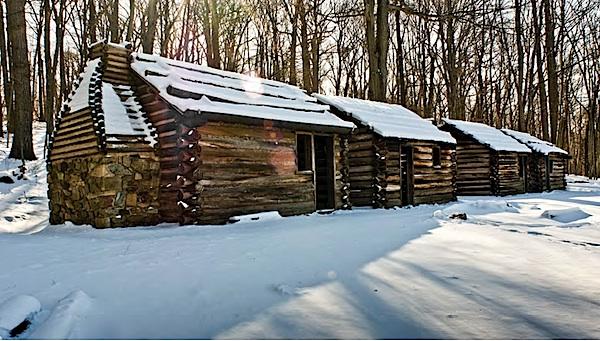
A winter visit to Jockey Hollow allows you to get a feel for the sparse accommodations the troops had/Crossroads of the American Revolution NHA
Winter isn't the best season to be outdoors in the East, but what better season to truly appreciate what the Colonials endured 240 years ago?
Valley Forge was a brutal place for the Continental Army during its 1777-78 winter encampment there. Food was hard to come by, clothing was little better than rags, disease ravaged the troops. Still, General Washington inspired the soldiers, and they quickly built a city of some 2,000 log huts in which they spent the winter. Walking the grounds today you'll find some replicas that convey the challenging conditions the soldiers endured.
Head 81 miles northeast from Valley Forge via U.S. 202 and you'll come upon the grounds at Jockey Hollow that brought even more hardship to the Continental Army, as the winter of 1778-79 was even colder and snowier than the year before. So cold was it that the Hudson River between New Jersey and New York reportedly froze so thick that cannons hauled across it didn't break through the ice.
To stay warm, the Colonials cleared a forest at Jockey Hollow, taking down more than 600 acres of oak, walnut, and chestnut trees to build huts to shelter the 10,000-12,000 troops. Those huts, by the way, were modeled after the ones erected the winter before at Valley Forge.
If there's snow on the ground, take off your shoes and stroll the encampment grounds, which feature a small handful of replica cabins, to get a sense of what many of the troops endured. Poke your head into the cabins. Measuring roughly 14 feet by 16 feet, they were designed to hold a dozen men.
'We are absolutely, literally starved. I do solemnly declare that I did not put a single morsel of victuals into my mouth for four days and as many nights, except for a little black birch bark which I gnawed off a stick of wood,' Private Joseph Plumb Martin wrote in his journal. 'I saw several men roast their old shoes and eat them...'
After sizing up the wooden bunks and tight quarters, head 5 miles into Morristown to visit Gen. George Washington's winter headquarters in the Ford Mansion, a sprawling, three-story home. For six months Washington, his top aides, and even his wife, Martha, occupied the mansion. Take the time to tour the home with a ranger and you'll see the room where the general wrote letters to Congress with requests that his troops receive more food and better clothing.

 Support Essential Coverage of Essential Places
Support Essential Coverage of Essential Places







Comments
One thing that has always struck me about the stories of Washington's winter encampments is the stark contrast between lives enjoyed by officers and, often, their wives and families and that endured by the common soldier.
I understand that was an accepted practice of the rigid class structure of the time, but it somehow does not enhance my opinion of the practice or those who practiced it.
And, it reminds me that not much has really changed. We still have the same kind of class structure gnawing at us today -- one that seems to be growing more and more pronounced as the disparities between Americans of power and those who work to support them become ever wider.
Just look at the long time concession employees at Grand Canyon and what may happen to them.
Yet we have the richest poor people in the world.
http://www.sfgate.com/news/article/America-has-the-world-s-richest-poor-...
That circumstance arose due the wisdom of our founding fathers and our embracement of the capitalist system. No doubt those virtues have been eroding since the emergence of the progressive mind set in the early 1900's and have eroded even more rapidly over the last several decades. It is no wonder that as government has become more intrusive and people more dependent, income inequality has broaded and class mobility has been reduced. If we keep on our current course our poor will be as the poor of the rest of the world.
An interesting irony, for sure, Lee, given a war fought, in part, against the legacies of European manorialism.